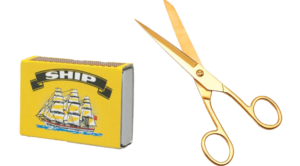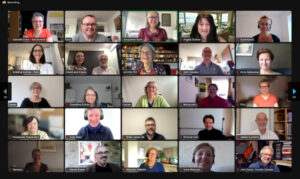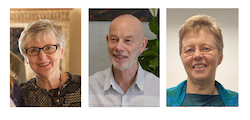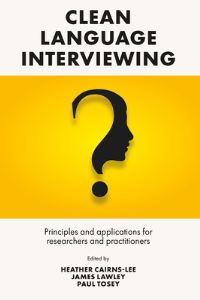This is Part 3 of a three-part series:
Part 1 describes our model of Self-deception, self-delusion and self-denial,
Part 2 provides guidance on what you can do once you recognise when, where and how you self-DDD (we all do at times!), and how to learn to act from what you know to be true.
In Part 3 we revisit the topic five year later by more modelling of how to act from what we know to be true.
Lilith to Fraser (on the television series that bears his name):
Background
How do you act from what you know to be true when you haven’t before, or it’s difficult, or you’re frightened of the consequences, or you’re not the kind of person who does?
In 2004 we ran a Developing Group day on Self-deception, Self-delusion and Self-denial. That was followed by a day on Learning to Act from You Know to be True. Since then we have continued to model how people do both. Almost all the books we’ve read on the subject give much the same advice, ‘Be more aware and then you’ll act differently’. We think, ‘Maybe, but how?’ As part of our ongoing research we are collecting detailed examples of the internal experience of people who have acted from what they know to be true (when that was difficult to do).
While each person’s process will be individual, there may be a number a characteristics present in most people’s experience. If this is the case, it would be nice to know. The December 5th Developing Group will be devoted to modelling examples from our lives. Below are a few guidelines about how to go about doing that.
Criteria for the class of experience we want to model
Some example contexts are:
- Giving honest feedback when you’d much rather not.
- Asserting your wants and needs when you always put others first.
- Speaking out when you’ve always considered yourself a team player.
- Standing up for your/others’ rights when you’ve kept quiet before.
- Taking a risk when you don’t have to, and you’d rather not, and you usually don’t.
- Holding back for the wider good when normally you would have to speak your mind.
- Being vulnerable when it’s important to be seen as strong.
- Admitting you made a mistake when you don’t make mistakes.
- Coming clean about a long-standing lie.
- Giving up an ideal, hope, expectation when you never give up.
Whistle blowing, when you know it is going to get you into big trouble.
We are not talking about being brave, honest, assertive, vulnerable in and of themselves. Instead we will focus on the process by which you acted from what you knew to be true when there were plenty of good reasons not to, or you really would rather not have, or it was a significant risk to do so. It seems most of the situations above involve:
Choosing to say or do something when that’s unusual for you in this context (possibly also choosing to not say or do something).
A challenge for you to say or do it.
An internal conflict; a risk; unwanted consequences; an ethical/moral decision.
A relationship with self set within a larger context.
It’s not about scale, i.e. how big or small the action/decision is, it about a person’s highly subjective evaluation of the situation.
There will always be a personal element because so much depends on the individual context, i.e. your history of self-deceit, how often you have acted from what you knew to be true, the potential consequences of acting/not acting, and the circumstances in the moment.
Example 1
A topical example of deciding to act from you know to be true — or not, is that of the French footballer Thierry Henry. Last week his ‘handball’ put France through to the 2010 World Cup in South Africa, and knocked underdogs the Republic of Ireland out of the competition. After the handball he had almost a minute in which to decide to inform the referee that the goal should not be allowed. He did not.
After the match Henry said: “Yes it was a handball. The ball came to me and rebounded off my hand. I am not the referee.”
The next day he said: “I am not a cheat and never have been. It was an instinctive reaction to a ball that was coming extremely fast in a crowded penalty area. As a footballer, you don’t have the luxury of the television to slow the ball down 100 times to be able to make a conscious decision.”
What the replay clearly shows is that the ball did not come at one of the world’s greatest footballers “extremely fast” and that it did not “rebound” off his hand, he actually handled the ball twice. The question is not that he did it in the heat of the moment, but what happened in the following sixty seconds when he had the choice to tell the truth?
The following day Henry was saying: “Naturally I feel embarrassed at the way that we won and feel extremely sorry for the Irish, who definitely deserve to be in South Africa. Of course the fairest solution would be to replay the game but it is not in my control.”
Too late Thierry, too late. For many, his reputation as an honest athlete is tarnished beyond repair.
Example 2
In States of Denial, Stanley Cohen, describes the case of someone’s slow transition to acting on what they know to be true:
Naomi, ever since her student days, had been active in progressive or leftist causes. But she found that her Jewish roots and her Zionist sympathies made it impossible for her to apply the same moral standards to Israel. The intifada became headline news from 1988, TV screens showing Israeli soldiers beating Palestinians in Gaza.Naomi found this impossible to watch. These images were too upsetting; they did not fit what she had always believed. In her heart she knew that the criticisms of Israel were true, and found government denials unconvincing. But she was unwilling to break the silence. She began to feel perpetually ashamed and stopped talking to her former political comrades as well as her more conservative Jewish friends and family. She felt sick – physically and emotionally.Gradually she was drawn back into watching TV, and then started obsessively reading sources more critical of Israel. After an arduous two years, she joined a progressive Jewish discussion group in San Francisco. Naomi knew she was still not ‘taking in’ everything, but felt ‘morally cleaner’ because she had stopped lying to herself and others. (p. 259)
Example 3
When seven astronauts died in the explosion of the space shuttle ‘Columbia’ in 2003, the launch integration manager at NASA, N. Wayne Hale Jr., sent a public email to the Space Shuttle team taking full responsibility for the disaster:
Modelling the Process
A sequence modelled out from one client’s session:
An external trigger started the process:
It felt like being physically hit.
I was thrown off kilter.
This was followed by a short period before they were sure:
It was too uncomfortable not being true to myself.
I couldn’t live with myself any longer.
I tossed and turned, and turned and tossed but became sure I had to do it.
Then there was a longer period after they were sure:
I had to overcome my reticence.
I protected myself from my doubts.
I knew this could have repercussions with the rest of my family.
I was aware I wanted to keep the door open.
I was aware of the tenuousness of what I was about to do.
They took action:
It’s the first time in my life I said ‘That’s enough, no more.’
After the action:
As I drove away I started shaking at the enormity of what I’d done.
You’ll notice that in this example there is very little description of the ‘becoming sure’ phase of the process.
A generalised model we’ve used to guide our modelling of how someone acts from what they know to be true has five phases:
- Before a decision or change of mind
- The decision or change of mind
- Between the decision and taking action
- Taking action
- After the action is taken.
Each phase will have it’s own timeframe. It might involve a slow build up that happens over a period of time or a something that happens in an instant – such as a sudden epiphany.
In the Naomi example above it seems that every phase took a long time.
By contrast, in James’ Whistle Blowing example below there is a slow build up over several months before the moment when the decision is taken. This is followed by a short period of double checking before the action is taken. After that a protracted period of reacting to the consequences follows. So for James it was slow, quick, slow, quick, slow.
Of course we are modelling each person’s subjective experience of the relative time each phase takes. These notes aim to give you some guidelines of what to be on the lookout for. It may be quite different for the exemplar you model.
We have noticed that what is most important is different for different people:
Sometimes an initial event sets everything in motion and the person doesn’t feel they have much choice after that.
Sometimes it’s the slow accumulation of evidence that makes acting an imperative.
At other times taking the decision and owning that is key.
For someone else, it’s all about getting the preparation for acting right.
For others, taking action is what matters most.
And lastly, sometimes it’s the follow-up or maintaining a stance that makes all the difference.
Questions for the modeller to muse upon (see A Model of Musing):
How do they know what is true for them?
Where do they remember/keep/store/hold what is true for them?
What is different this time? What keeps them from not deceiving themselves, ignoring the situation, forgetting to act, etc. this time?
Are any scales and thresholds involved?
Is something more than ‘self-interest’ involved? If so, how does it appear in their Metaphor Landscape, and what function does it serve?
Modelling James’ decision to become a whistle blower
How did you know you were acting from what you know to be true?
It wasn’t an instant knowing. I had to come to it over a period of time. After consideration and talking to others I knew what was true for me. I had a growing feeling of rightness when I thought about it. It became solid in here (points to chest). But I was not calm. I was nervous around acting. There was solid around the knowing what was right for me. But getting to that and then acting on it was not easy. I knew it was an important decision.
To get to this point I had to separate what was right for me and that I was going to act on it. The more I knew the truth, the harder it was not to act. The more and more sure I became, the less and less chance there was I’d not act.
And then what happened?
There was a specific moment I knew I’d decided to act. I did one last check. I’d discussed what I was considering doing with a number of people whose opinion I respected – six as it happens. This helped me see what I may have missed, and to think things through. While telling one of them it was like the final piece went into place and I thought “I’m going to have to do this.” Then I knew it was only a matter of time. I said to myself, I’ll sleep on it to double check. When I awoke, it was a done deal.
Anything else about how you came to this knowing?
There’s an important historical factor. Five years ago I was faced with another similar decision. I thought “I’ll get around to it,” and “Someone else will do it”. But I didn’t get around to it and neither did anyone else, and that organisation collapsed. I vowed never to let this happen again. I don’t know if I would have acted this time without the first situation as a motivator. I felt bad I left it up to others. I let myself down and let others down. I had really clear knowledge of what could happen if I did nothing.
And are there any other factors?
Another factor was I knew in the long run I would feel better about myself. But I didn’t fully know the consequences. I didn’t know how it would turn out, thank heaven. If I had known how much angst it would cause, I might never have gone ahead with it. But if I didn’t act, the feeling bad about myself could have hung around for decades. Maybe I’d feel bad for the rest of my life. I was in angst for weeks before the final piece came into place. I knew it would nag and nag and nag at me, because the outside situation wasn’t going to change, it was getting worse. Although there were lots of reasons not to do it I felt it was the right thing to do.
And where did you feel it was the right thing to do?
It was like a washing machine in my stomach. Slowly but surely the washing machine stopped and things became more and more solid. The issues got clearer. I could separate out my feeling from the bigger picture. I got clear about the issues, my feelings and the bigger picture. This was all part of my growing solidity. It got clearer as the turning slowed down, and it got more solid. Looking back I can see the slowing down, increasing clarity and growing solidity supported each other in a self-sustaining loop.
And is there anything else about that self-sustaining loop?
I could separate out taking the decision from my feelings. Even though I was nervous I realised I wasn’t doing this for me. Somebody had to do it and I just happened to be that somebody. But before I did anything I double- and triple-checked by getting external feedback. By the end I’d done everything I reasonably could to check before making my decision. My decision to act.
Anything else about the moment you acted?
No more reasons not to. I’d run out of reasons for delaying, things to consider. When the last thing went into place, no more evidence was needed.
What’s the first thing you did?
It turned out that the first thing I did was an irreversible action. Once I’d started the ball rolling I couldn’t stop it. I composed an email. Then I pressed ‘send’.
And what happened just before you pressed ‘send’?
The moment just before, I did all the checks again in a minute. An extra quadruple check. But it was a done deal. I couldn’t back out. I couldn’t have lived with myself, it would have been too painful.
Anything else after you pressed ‘send’?
I notice there is a huge element of away-from in all this. Until I pressed ‘send’ I had no good feelings. Nothing to feel good about. My away-from feelings were immediate and filling my awareness. Until I pressed the send button, the good feelings were hypothetical. I didn’t get the good feelings until after I’d done it. If I had waited to feel the good feelings before doing it, I would have never got around to doing it!
Quotes about truth
We leave you to contemplate some wise words about this subject:
“And ye shall know the truth, and the truth shall make you free.”
John 8:32.
“To thine own self be true, and it must follow, as the night the day,
thou canst not then be false to any man.”
William Shakespeare
“To treat your facts with imagination is one thing,
to imagine your facts is another.”
John Burroughs
“You can only find truth with logic if you have already found truth without it.”
G.K. Chesterton
“Much truth is spoken, that more may be concealed.”
Lord Darling
“It is an old maxim of mine that when you have excluded the impossible,
whatever remains, however improbable, must be the truth.”
Sherlock Holmes
“A truth that’s told with bad intent, Beats all the lies you can invent.”
William Blake
“The truth that makes men free,
is for the most part,
the truth which men would prefer not to hear.”
Herbert S Agar
“’Tis strange — but true;
for truth is always strange.”
Lord Byron
“Be so true to thyself,
as thou be not false to others.”
Francis Bacon
“True and False are attributes of speech,
not of things.
And where speech is not, there is neither Truth nor Falsehood.”
Thomas Hobbes
“It’s easy to make a man confess the lies he tells to himself;
it is far harder to make him confess the truth.”
Geoffrey Household
“There are no whole truths; all truths are half-truths.
It is trying to treat them as whole truths that plays the devil.”
A.N. Whitehead
“Truth has no special time of its own. Its hour is now — always.”
Albert Schweitzer








